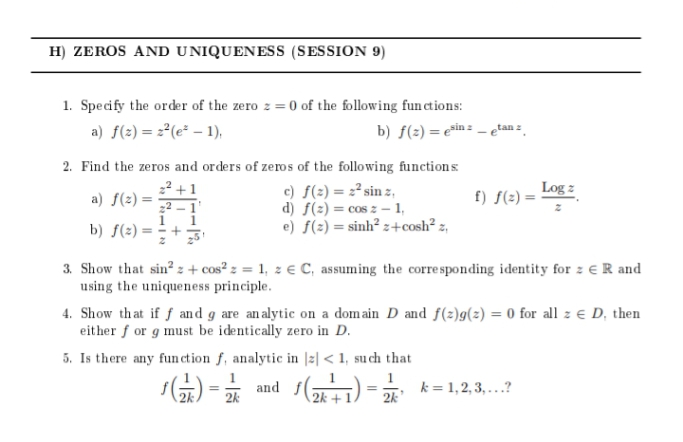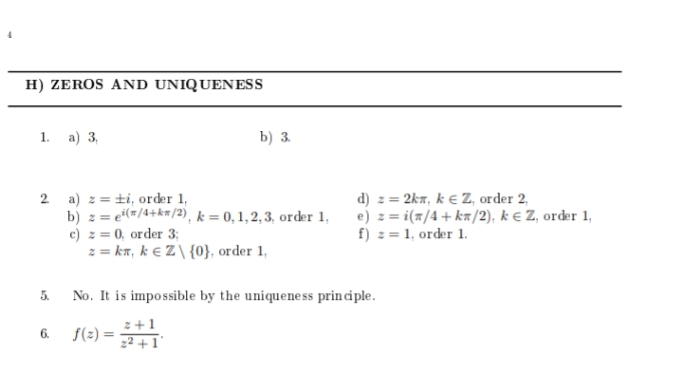1. Specify the order of the zero z = 0 of the following functions: a) f(2) = z²(e* – 1), b) f(2) = ein = – etan z
1. Specify the order of the zero z = 0 of the following functions: a) f(2) = z²(e* – 1), b) f(2) = ein = – etan z
Algebra & Trigonometry with Analytic Geometry
13th Edition
ISBN:9781133382119
Author:Swokowski
Publisher:Swokowski
Chapter7: Analytic Trigonometry
Section7.2: Trigonometric Equations
Problem 98E
Related questions
Question
Do 5 in detail with explaination

Transcribed Image Text:H) ZEROS AND UNIQUENESS (SESSION 9)
1. Specify the order of the zero z = 0 of the following functions:
a) f(2) = 2°(e² – 1),
b) f(2) = e*in = - etan :
2. Find the zeros and orders of zeros of the following functions
2? +1
22 -1'
1
b) f(2) = ÷+3
Log z
f) f(2) =
c) f(2) = 2² sin z,
d) f(2) = cos z – 1,
e) f(2) = sinh² z+cosh² z,
a) f(2) =
3. Show that sin? z + cos² z = 1, z € C, assuming the corresponding identity for z e R and
using the uniqueness principle.
4. Show that if f and g are an alytic on a domain D and f(2)g(2) = 0 for all z e D, then
either f or g must be identically zero in D.
5. Is there any fun ction f, analytic in |z| < 1, su ch that
1
and f()
k = 1,2, 3, ...?
2k
2k
2k

Transcribed Image Text:H) ZEROS AND UNIQUENESS
1.
a) 3,
b) 3.
a) z = ti, order 1,
b) z = e(#/4+k#/2), k = 0, 1,2,3, order 1,
c) z = 0, order 3;
2 = kr, k e Z \ {0}, order 1,
d) z = 2kr, k e Z, order 2,
e) z = i(z/4+ ka /2), k e Z, order 1,
f) z = 1, order 1.
2.
5.
No. It is impossible by the uniquene ss principle.
z +1
f(2) =
22 + 1'
6.
Expert Solution
This question has been solved!
Explore an expertly crafted, step-by-step solution for a thorough understanding of key concepts.
Step by step
Solved in 2 steps

Recommended textbooks for you

Algebra & Trigonometry with Analytic Geometry
Algebra
ISBN:
9781133382119
Author:
Swokowski
Publisher:
Cengage

Algebra & Trigonometry with Analytic Geometry
Algebra
ISBN:
9781133382119
Author:
Swokowski
Publisher:
Cengage